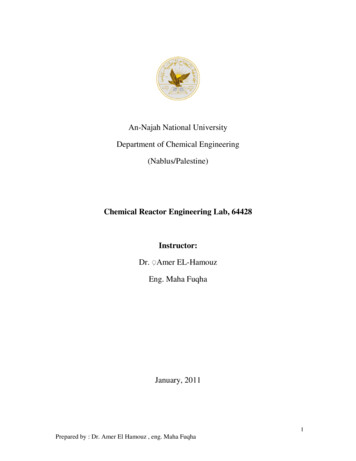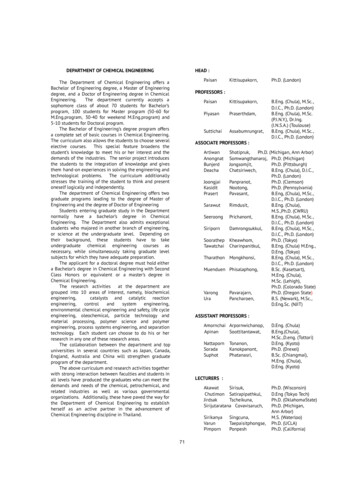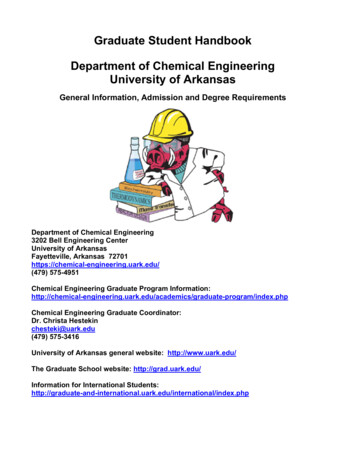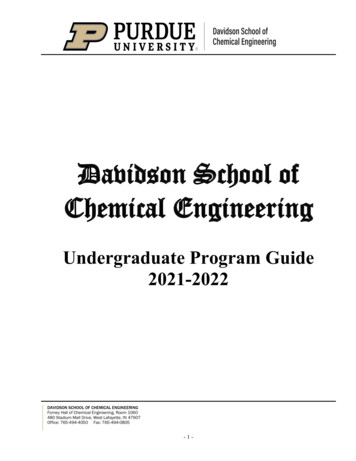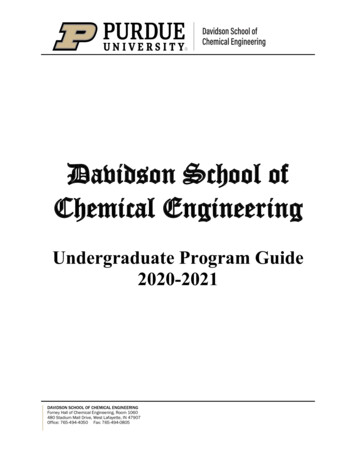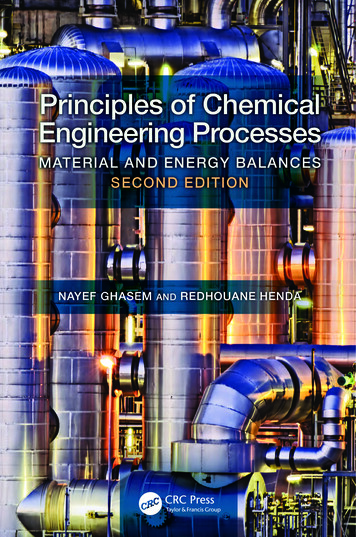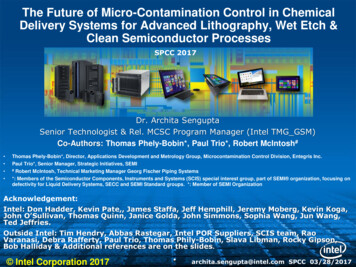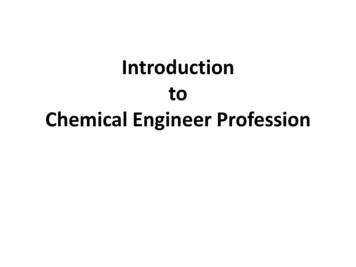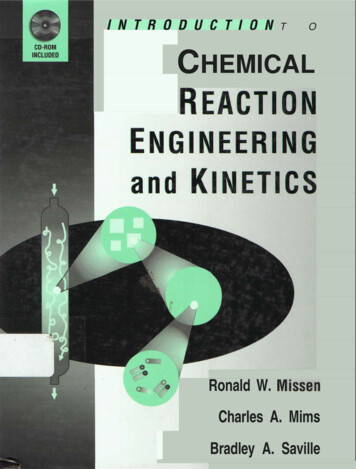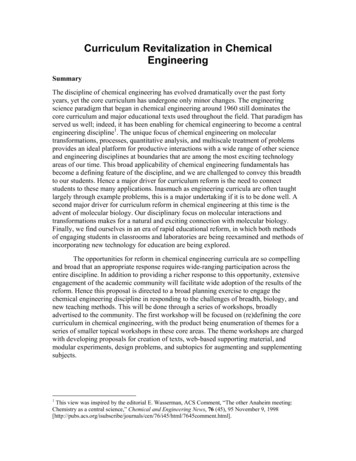
Transcription
Curriculum Revitalization in ChemicalEngineeringSummaryThe discipline of chemical engineering has evolved dramatically over the past fortyyears, yet the core curriculum has undergone only minor changes. The engineeringscience paradigm that began in chemical engineering around 1960 still dominates thecore curriculum and major educational texts used throughout the field. That paradigm hasserved us well; indeed, it has been enabling for chemical engineering to become a centralengineering discipline1. The unique focus of chemical engineering on moleculartransformations, processes, quantitative analysis, and multiscale treatment of problemsprovides an ideal platform for productive interactions with a wide range of other scienceand engineering disciplines at boundaries that are among the most exciting technologyareas of our time. This broad applicability of chemical engineering fundamentals hasbecome a defining feature of the discipline, and we are challenged to convey this breadthto our students. Hence a major driver for curriculum reform is the need to connectstudents to these many applications. Inasmuch as engineering curricula are often taughtlargely through example problems, this is a major undertaking if it is to be done well. Asecond major driver for curriculum reform in chemical engineering at this time is theadvent of molecular biology. Our disciplinary focus on molecular interactions andtransformations makes for a natural and exciting connection with molecular biology.Finally, we find ourselves in an era of rapid educational reform, in which both methodsof engaging students in classrooms and laboratories are being reexamined and methods ofincorporating new technology for education are being explored.The opportunities for reform in chemical engineering curricula are so compellingand broad that an appropriate response requires wide-ranging participation across theentire discipline. In addition to providing a richer response to this opportunity, extensiveengagement of the academic community will facilitate wide adoption of the results of thereform. Hence this proposal is directed to a broad planning exercise to engage thechemical engineering discipline in responding to the challenges of breadth, biology, andnew teaching methods. This will be done through a series of workshops, broadlyadvertised to the community. The first workshop will be focused on (re)defining the corecurriculum in chemical engineering, with the product being enumeration of themes for aseries of smaller topical workshops in these core areas. The theme workshops are chargedwith developing proposals for creation of texts, web-based supporting material, andmodular experiments, design problems, and subtopics for augmenting and supplementingsubjects.1This view was inspired by the editorial E. Wasserman, ACS Comment, “The other Anaheim meeting:Chemistry as a central science,” Chemical and Engineering News, 76 (45), 95 November 9, 6/i45/html/7645comment.html].
Curriculum Revitalization in Chemical Engineering2IntroductionSeveral factors combine to make this a critical time for re-evaluation and redefinition ofthe curriculum in chemical engineering: (i) the evolution of chemical engineering from adiscipline tied to a single industry, the petro-chemical industry, to a discipline thatinteracts across a broad range of industries and technologies, (ii) the advent of molecularbiology, which provides a second molecular science to serve as one of the pillars ofchemical engineering, and (iii) the rapid developments of new understandings of learningand teaching methods in science and engineering. Responding to these fundamentalchanges in chemical engineering requires a broad engagement of the entire discipline,and this proposal takes such an approach. A series of workshops is described with thegoal of developing a plan for new curriculum development in chemical engineering thataddresses the three drivers identified above. The result of these workshops will be aproposal for funding specific curriculum development projects across a wide range ofdepartments and with the serious engagement of industry.This proposal is an outgrowth of a meeting of heads of chemical engineeringdepartments in the United States that was held at the 24th annual meeting of the Councilfor Chemical Research (CCR) in Cincinnati during March of this year. This chemicalengineering department chairs meeting focused on the need for unified action by thechemical engineering discipline in response to the issues noted above in order to maintaincohesiveness in the discipline and in order to respond fully and effectively to theopportunities afforded by these challenges. The approximately forty department heads atthis meeting were most enthusiastic about participating in a discipline-wide response tothis NSF program on curriculum reform in engineering. A group of nineteen departmentheadsLudlow, DouglasBaltzis, BasilKilpatrick, PeterRousseau, RonaldAnderson, TimLeVan, DougGlatz, CharlesManke, CharlesMartin, GeorgeO’Connell, JohnAnthony, RayfordHawley, MartinOlbricht, WilliamKiran, ErdoganChambers, RobertCollier, JohnGrossmann, IgnacioZukoski, CharlesArmstrong, RobertUniversity of Missouri – RollaNew Jersey Institute of TechnologyNorth Carolina State UniversityGeorgia Institute of TechnologyUniversity of FloridaVanderbilt UniversityIowa State UniversityWayne State UniversitySyracuse UniversityUniversity of VirginiaTexas A&M UniversityMichigan State UniversityCornell UniversityVirginia Polytechnic UniversityAuburn UniversityUniversity of Tennessee, KnoxvilleCarnegie Mellon UniversityUniversity of Illinois at Urbana ChampaignMassachusetts Institute of Technology
Curriculum Revitalization in Chemical Engineering3agreed to serve as one of CCR’s Action Network Groups in order to facilitate this project.This group will serve as the planning group for the proposed workshops, and this largegroup guarantees broad participation across the discipline. Of course, the proposedworkshops are not limited to this group, and we will invite all departments to participate.Three members of this group – Robert Armstrong, Ronald Rousseau, and CharlesZukoski – agreed to write this proposal to seek NSF support. Although this proposal isbeing submitted through MIT for pragmatic reasons, the Council for Chemical Research(CCR) should be regarded as the sponsoring organization. This is appropriate because ofCCR’s mission in fostering collaboration across the chemical sciences and engineeringsector.Evolution of Chemical EngineeringThe 1990s saw dramatic increases in enrollments in undergraduate programs in chemicalengineering around the country, as a response to the increasing demand for chemicalengineers in a variety of industries. The diversity of employment opportunities forchemical engineers today is illustrated in Fig. 1, which shows the initial job employmentfor bachelors degree chemical engineers in 2001. Though this proposal focuses onundergraduate education, similar issues exist in graduate programs; and employmenttrends for chemical engineers at the masters and doctoral degree levels mirror the plot inFig. 1. The value of chemical engineers to these industries lies in the combination ofprocess, molecular, quantitative, and systems approaches that chemical engineers bring tobear on these technologies.The central role that chemical engineering plays today as an engineering discipline isdepicted in Fig. 2. Most departments of chemical engineering in the United States grewup along the horizontal axis and this figure, that is, they developed from a merging ofchemistry and mechanical engineering. Therefore, many of the early applications ofchemical engineering naturally fell within the domains of applied chemistry and energyand transportation. In recent years many new industries have come to appreciate the needfor process engineering and have realized the potential benefits to new products ofmolecular engineering coupled with multiscale analysis and process design. This leadsnaturally to the broad range of interactions between chemical engineering and essentiallyall other engineering and science disciplines that is depicted in Fig. 2. Clearly chemicalengineering does not displace these other disciplines, but works cooperatively with themat the exciting interfaces that appear in the annular ring in this figure. It is clear from apicture such as Fig. 2, that exciting new technology developments require couplings ofdifferent disciplines. A clear message from this figure for curriculum revision is that weneed to teach our students a well defined core set of fundamentals in our discipline alongwith an attitude that encourages collaboration across disciplinary boundaries.At the same time as our graduates have been drawn into a broad range of newindustries, the petrochemical industry with which we have been traditionally associatedhas been undergoing dramatic changes: The industry is becoming increasingly global.
Curriculum Revitalization in Chemical Engineering4 There have been many mergers of companies and product lines. Chemical companies are becoming life science companies and spinning offchemical units. Some chemical companies are becoming virtual companies, outsourcing servicesincluding research traditionally done in-house. Chemical engineering is no longer dominated by the petrochemicals/bulkchemicals businesses (as evidenced by Fig. 1). Employees no longer expect life-time careers with a single company; ourgraduates can expect to have multiple professional jobs during a career.Curriculum reform must also address these issues, most critically the increasingly centralrole of biology in our traditional industries and the need to prepare our students forversatile, multifaceted careers.Business Svcs. 5.8%Other 3.9Engrg. Svcs.-Environmental 2.4%Engrg. Svcs.-Research& Testing 1.8%Engrg. Svcs.-Design& Cnstrctn. 5.6%Chemical 23.3%Pulp & Paper 2.1%Biotech./RelatedIndustries (Pharma) 9.3%Materials 3.1%Food/ConsumerProducts 10.6%Electronics 15.9%Fuels 15.7%Figure 0. Industrial employment of B.S. chemical engineers starting in 2001. Data from AIChECareer Services (2001).
Curriculum Revitalization in Chemical ironmentalApplicationsCivil EngineeringFigure 0. Chemical engineering has a unique position between the molecular sciences andengineering.Biology as the Fourth Pillar of Chemical EngineeringThe development of biology as a molecular science over the past two decades hasprovided a much more natural connection between biology and chemical engineeringthan has previously existed. Opportunities for taking knowledge of molecular interactionsand reactions in biological systems and translating these into solutions of social andtechnological importance are numerous. The following list enumerates some of theproblems to which chemical engineers are naturally positioned to contribute2:2 Bioprocess (biochemical reaction engineering, bioreactors with resultingbioseparations). Important in production of pharmaceuticals or commodity andenergy products and are an integral part of waste treatment. Bioseparations. Supports bioprocesses, but is also of importance in medicalapplications such as cell separations (e.g., stem cell recovery) and proteomics(e.g., total analysis of protein content in a cell) Biocatalysis. Generation of protein catalysts with novel or enhanced activities,often in unusual environments. Metabolic engineering. Gene therapy – metabolic engineering combined with drug delivery. Quantitativeproblem requiring systems analysis. BiomaterialsM. Shuler, Presentation to External Advisory Board, Department of Chemical Engineering, CarnegieMellon University, May 8, 2002.
Curriculum Revitalization in Chemical Engineering6 Controlled release of bioactive compounds or surface modifications Tissue replacement Cell and tissue engineering combines biomaterials and broad concepts frommetabolic engineering and analysis of chemical signaling. Manufacturingprocesses are similar to bioprocessing Drug delivery Drug/chemical metabolism predictions with physiologically basedpharmacokinetic models Drug design and discovery (computational tools developed by chemical engineersfor understanding protein-ligand interactions and chemical signaling in cells).Many other disciplines play here as well. Functional genomics or relating molecular or genomic information to cellfunction. Nano(micro)biotechnology, e.g., lab-on-a-chip devices.Such a rich range of applications together with the natural fit as an underlyingscience for chemical engineering challenge the discipline to rethink fundamentally itscore curriculum. Indeed this fundamental shift in core curriculum is mirrored in therenaming of many traditional chemical engineering departments to include biologyexplicitly as part of the name. For example, the departments at Cornell University and atthe University of Illinois at Urbana Champaign have recently each been renamed theDepartment of Chemical and Biomolecular Engineering. The Department of ChemicalEngineering at MIT has recently recognized this shift in its core science requirements,replacing one semester of organic chemistry with biochemistry; two core biology subjectsare now required in the chemical engineering curriculum in additional to two restrictedelective subjects.New Educational MethodsCoupled with the fundamental intellectual drivers for curriculum reform in chemicalengineering are the improvements in both mechanisms for delivering educational contentthrough the web and also methods for more effective direct-contact education. Theformer is particularly important for this proposal, as the use of the web for deliveringeducational materials provides a mechanism for sharing educational developments acrossthe wide spectrum of universities that we plan to bring together for this program. Forexample, the job of developing new examples for traditional subjects such asthermodynamics can be spread over many faculty, and the results shared over theinternet. It is even possible to share the development of new laboratory experiments. Seefor example the web site used in MIT’s subject 10.26, Chemical Engineering Projects, fordoing heat exchange experiments over the web (http://heatex.mit.edu/)3. Students use theweb interface to run actual experiments, not simply simulations of experiments. This3MIT Tech Talk, May 22, 2002, p. 8. See also .html.
Curriculum Revitalization in Chemical Engineering7experiment is currently used in a subject at the University of Texas, Austin, as well as atMIT.Numerous educational studies have highlighted the importance of active learning intechnical education. This impacts a curriculum reform such as that proposed here inseveral ways. First it is important to develop a set of design problems that can be used tointroduce students to the breadth and opportunity of chemical engineering at an earlystage in their academic studies. This is important for motivating the sequence offundamental subjects that constitute much of the core curriculum. Second, thedevelopment of small, relevant examples for coupling with core subjects can substantiallyenhance understanding. Third, a broad range of design problems for use in capstonesubjects in chemical engineering can provide valuable confidence to the students in howto apply chemical engineering fundamentals in new situations.Proposed Planning WorkshopsPrior to the beginning of the workshops proposed here, and as a follow-up to theCincinnati chemical engineering department heads meeting, CCR and Shell Oil Companywill co-sponsor a workshop in July at a Shell Oil conference facility near Houston(Woodlands). Shell Oil’s CEO, Dr. Steven Miller has graciously agreed to host thisworkshop. The purpose of this workshop is to bring together leaders from academicdepartments, the broad array of industries served by modern chemical engineering, andgovernment to develop a series of white papers addressing chemical engineering’s rolesand opportunities with respect to technologies based on the molecular sciences ofchemistry and biology. These white papers will serve as excellent starting points for theworkshops proposed here.The Chemical Engineering Curriculum for the FutureThe lead workshop for this curriculum reform planning project will focus on identifyingkey elements of the chemical engineering curriculum for the future, producing a roadmap for evolving core curriculum, and tasking a set of follow-on topical workshopsdescribed in the next subsection. Key issues to be addressed in this workshop include: The role of biology in the new curriculum. Clearly chemical engineering cannot,nor could any other discipline in an undergraduate program, embrace the fullbreadth of biology in its curriculum. Early on we need to choose those aspects ofbiology that fit together with chemical engineering’s focus. We need to integrateclearly biology as a basic science and one of the four pillars of chemicalengineering: biology, chemistry, physics, and mathematics. This requires, at aminimum, the major undertaking of meaningful integration of biologically basedexamples throughout the curriculum, e.g., biological reactions, separations, etc.We need to think about the inclusion of entirely new subjects, such asbioinformatics and systems biology.
Curriculum Revitalization in Chemical Engineering8 What is the right balance between fundamentals and applications in thecurriculum? Chemical engineering has traditionally taught fundamentally focusedcurriculum, with the goal of preparing students to tackle new problems notenvisioned at the time of their education. Clearly this is still paramount, yet weneed to weave applications through out the curriculum in order to engage studentsactively in the learning process. This discussion should build on the themes ofmolecular transformations, quantitative understanding, systems treatment, andmultiscale analysis, which have served chemical engineering well. How do we best connect to the breadth of applications illustrated in Fig. 2 in thecurriculum? Our students need a strong sense of the versatile set of problems theyare prepared to address. We need to strike a balance between the desire to teach our students manydifferent topics and the need to use the diverse topics to prepare our students forthe future. How do we attract the best and brightest minds to our discipline? A revitalizedcurriculum is key part of this, but we need to engage other groups, e.g., AIChE, ina campaign to get our message to the public. This is very important for ensuring adynamic and well-educated essential segment of the workforce for thebiotechnology, chemicals, and advanced materials industries of the future. A spinoff activity of this workshop will be connections with appropriate groups for helpin articulating what we do to the public.We will solicit wide spread participation in this initial workshop from chemicalengineering educators and from the breadth of industries that hire our graduates now orthat we expect to hire our graduates in the future. In addition, we will invite educationalspecialists to help ensure that the group is aware of recent advances in understanding oftechnical learning. Invitations will be sent to all chemical engineering departments in theU.S., and we will develop a list of industrial participants through the industrial membersof CCR as well as through the industrial participants at the Woodlands workshop in July.Topical WorkshopsSmall workshops will be organized in focus areas identified in the kickoff workshop. Itwould be presumptuous to identify or specify these topical workshops at this point. If wewere organizing these topical workshops around a contemporary chemical engineeringcurriculum, the list might include: Introduction to Chemical EngineeringThermodynamicsTransport processesReaction engineeringSeparationsChemical Engineering LaboratoriesDesign
Curriculum Revitalization in Chemical Engineering9The topical workshop in reaction engineering might then focus on a new subject built ona premise that all chemical engineers take biochemistry as well as organic chemistry as aprerequisite. Appreciation of processes at the molecular-cellular level could beemphasized and linked to the context of the reaction problem. Connections betweenmolecular mechanisms and macroscopic kinetics could be made and tied to reactor andwhole-cell modeling. Modular approaches to this subject would allow flexibility inadapting the material for use in a variety of chemical engineering departments whereprerequisites may vary. Similarly, a chemical and biological separations subject mightdeviate substantially from a traditional subject as follows: Reduce emphasis on traditional separationso Concepts introduced through volatility based separations, stagedprocesses, distillation with reflux, etc. Steady State Rate Processeso Membranes, RO, UF, diafiltration, cell and protein separationso Electrophoresiso Absorption, stripping, extraction (briefly) Fixed Bed Rate Processeso Adsorption and ion exchangeo Chromatography - HPLC, GPC, affinity, reverse phase, etc. Miniaturization of separation processesThe topical workshops will be charged with developing specific plans for distributedproduction of educational texts, modules, design problems, etc. in the respective topicalareas.Summary workshopThe final workshop proposed here is designed to bring the different topical groups backtogether to ensure integration and coherence of the overall curriculum development plan.In order to maximize participation by the chemical engineering community in thissummary workshop, we plan to hold it in conjunction with an annual meeting of theAmerican Institute of Chemical Engineers. The goals of this final workshop are to disseminate of plans developed in the topical workshops for specificcurriculum development; to solicit response from the broad chemical engineering community, includingmembers from academia, industry, and government; and
Curriculum Revitalization in Chemical Engineering 10to finalize and coordinate plans for the follow-on proposal for actual developmentof new curriculum.We expect to use a similar vehicle in ensuing years to keep the chemical engineeringcommunity up-to-date on the curriculum reform project.ConclusionThe emergence of biology as a molecular science, the evolution of chemical engineeringinto a central engineering discipline, and the increased understanding of technicaleducation methods make this an opportune and critical time for significant curriculumreform in chemical engineering. This proposal is focused on widespread participation bythe chemical engineering community in this exciting and crucial activity. From the seriesof workshops proposed here, a road map for curriculum reform and specific newcurriculum development projects will be developed. These will be proposed to NSF in thefollow-on proposal cycle. The broad participation achieved in this proposal is essential toensuring that the curriculum development efforts find widespread use.
curriculum in chemical engineering, with the product being enumeration of themes for a . Martin, George Syracuse University O'Connell, John University of Virginia Anthony, Rayford Texas A&M University . Civil Engineering Materials Science Chemistry Physics Chemical Engineering Computer Science Mathematics Figure 0. Chemical engineering .
